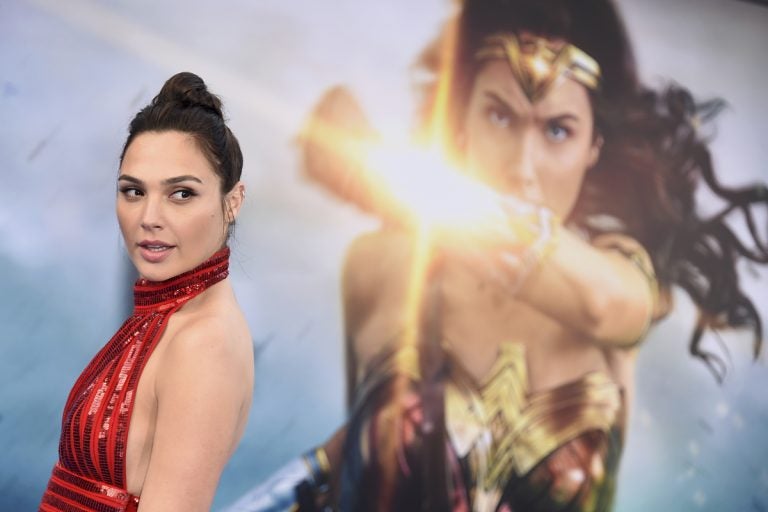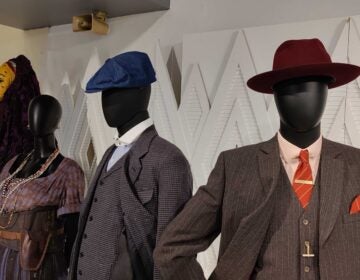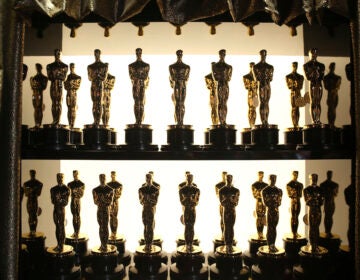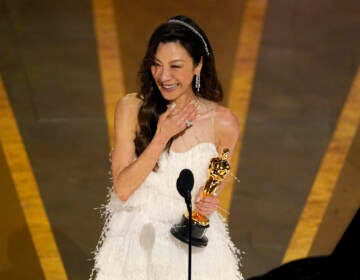Can ‘Wonder Woman’ break through the Best Picture glass ceiling?
Superhero movies have been considered more technical than cinematic, but "Wonder Woman" has the opportunity to become the first one to be nominated for the Best Picture Oscar.

"Wonder Woman" actress Gal Gadot arrives at the film's world premiere on May 25, 2017, in Los Angeles. (Photo by Jordan Strauss/Invision/AP, File)
Last summer “Wonder Woman” shattered the glass ceiling for female-led blockbusters and comic book movies. The picture grossed $821 million around the world, was beloved by critics, and sparked a cultural phenomenon.
The film also has the opportunity to break down one final barrier by becoming the first comic book superhero movie to ever be nominated for the Academy Award for Best Picture.
Over the last 90 years, the Academy of Motion Picture Arts and Sciences has seen fit to honor just about every other kind of film. Even those types of movies that are often neglected by critics, like animation, comedy, foreign, horror, science fiction, and fantasy have at one time or another scored a nod.
From the beginning, however, the superhero genre was considered more of a technical achievement than a cinematic one.
Back in 1978, when Richard Donner’s “Superman” made viewers believe a man could fly, the visual effects were awarded a special achievements Oscar. The picture also earned nominations for score, sound, and editing, but that unspoken division between spectacle and art was established.
A decade later, Tim Burton’s “Batman” scored a win for art direction. Despite the explosion of comic book adaptations in the aftermath of Batmania, it wasn’t until 2004 when “Spider-Man 2” won the Best Visual Effects statue.
This was all supposed to change, though, with the release of “The Dark Knight” in 2008. A colossal success critically, financially, and culturally, Christopher Nolan’s pic had the first serious chance of grabbing one of those five precious nominations.
The film did earn nominations in eight categories, but not Best Picture. Heath Ledger’s remarkable performance as the Joker won Best Supporting Actor, yet Nolan wasn’t nominated for directing or writing. And a Best Sound Editing victory made it the first comic book movie to win multiple Oscars. Despite that feat, it would take eight years from another superhero film to win an Academy Award, when “Suicide Squad” received Best Makeup and Hairstyling.
Many observers thought that “The Dark Knight” and other films that year were snubbed, which had lasting implications for the show. Just a few months later, the Academy expanded the Best Picture field from five to 10 nominations to allow for the inclusion of usually overlooked genres. (It’s since been adjusted again so that the total number is between five and 10.) While the popularity and proliferation of comic book movies reached new heights, still no nominations came.
So can “Wonder Woman” really change that?
The Oscar experts — and there’s a plethora of them — point to the guild awards as the most worthwhile predictor: the Directors Guild, Producers Guild, and Writers Guild awards.
On that front, Diana Prince is only one for three, with a nomination for the Producers Guild of America Award for Best Theatrical Motion Picture — though the PGA is considered the most accurate indicator.
Of course there’s also the political factor. Contributing to the “Wonder Woman” sensation is the fact that it was considered an important film. It hit theaters only months after Hillary Clinton won the popular vote but not the presidency and the Women’s March became the largest protest in American history.
Since then, the revelations about Harvey Weinstein and several other Hollywood power players have brought greater attention to the #MeToo movement and inspired Time’s Up. It’s hard to imagine there ever being a more perfect time for one particular film.
The Academy longs to be seen as a progressive trailblazer, and Patty Jenkins’ picture gives them a golden opportunity.
Imagine removing the superhero aspect altogether. You’d have a tremendous tale set in World War I featuring terrific acting, solid writing, and spectacular set pieces. On top of that is the all too rare well-told love story and an inspirational female protagonist. There’s no way a film like that doesn’t walk away with at least a dozen Oscar nominations. So why shouldn’t this one?
A snub would provoke the question: If “Wonder Woman” can’t secure a Best Picture nomination, what comic book superhero film possibly could?
Oscar Wins for Comic Book Movies
| Year of Release |
Title | Oscar Nominations |
Oscar Wins | Winning Categories |
| 1978 | Superman | 3 | 1 | Special Achievement for Visual Effects |
| 1989 | Batman | 1 | 1 | Best Art Direction |
| 1992 | Batman Returns | 2 | 0 | |
| 1995 | Batman Forever | 3 | 0 | |
| 2002 | Spider-Man | 2 | 0 | |
| 2004 | Spider-Man 2 | 3 | 1 | Best Visual Effects |
| 2005 | Batman Begins | 1 | 0 | |
| 2006 | Superman Returns | 1 | 0 | |
| 2008 | The Dark Knight | 8 | 2 | Best Supporting Actor and Best Sound Editing |
| 2008 | Iron Man | 2 | 0 | |
| 2010 | Iron Man 2 | 1 | 0 | |
| 2012 | The Avengers | 2 | 0 | |
| 2013 | Iron Man 3 | 1 | 0 | |
| 2014 | Guardians of the Galaxy | 2 | 0 | |
| 2014 | Captain America: The Winter Soldier | 1 | 0 | |
| 2014 | X-Men: Days of Future Past | 1 | 0 | |
| 2016 | Suicide Squad | 1 | 1 | Best Makeup and Hairstyling |
| 2016 | Doctor Strange | 1 | 0 |
WHYY is your source for fact-based, in-depth journalism and information. As a nonprofit organization, we rely on financial support from readers like you. Please give today.





